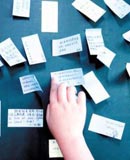不支持Flash
|
2010考研指导:英语阅读经典习题及答案(2)
Ms. Carr still has cancer, but it has stopped progressing. Her cancer tips include using time-saving mass e-mails to keep friends informed, sewing or buying fashionable hospital gowns so you're not stuck with regulation blue or gray and playing Gloria Gaynor's "I Will Survive" so loud you neighbors call the police. Ms. Carr also advises an eyebrow wax and a new outfit before you tell the important people in your illness. " people you tell are going to cautious and not so cautiously try to see the cancer, so dazzle them instead with your miracle," she writes。
While her advice may sound superficial, it gets to the heart of what every cancer patient wants: the chance to live life just as she always did, and maybe better。
6. Which of the following groups is more vulnerable to cancer?
A. Children。
B. People in their 20s and 30s。
C. Young adults。
D. Elderly people。
7. All of the following statements are true EXCEPT Kris Carr _______
A. is a female writer
B. is more than 31-year-old。
C. works in a cancer center。
D. is very optimistic。
8. The phrase "cancer posse" (Line 4, Para.3 ) probably refers to ________
A. a cancer research organization。
B. a group of people who suffer from cancer。
C. people who have recovered from cancer。
D. people who cope with cancer。
9. Kris Carr make up names for the people who treat her because ________
A. she is depressed and likes swearing。
B. she is funny and likes playing jokes on doctor。
C. she wants to leave the medical advice to doctor。
D. she tries to leave a good impression on doctor。
10. From Kris Carr's cancer tips we may infer that ________
A. she learned to use e-mails after she got cancer。
B. she wears fashionable dress even after suffering from cancer。
C. hospital gowns for cancer patients are usually not in bright colors。
D. the neighbors are very friendly with cancer patients。
参考答案
C C B C C
Text 3
Should a leader strive to be loved or feared?This question,famously posed by Machiavelli,lies at the heart of Joseph Nye's new book. Mr.Nye, a former dean of the Kennedy School of Govemment at Harvard and one-time chairman of America's National Intelligence Council, is best known for promoting the idea of "soft power", based on persuasion and influence, as a counterpoint to "hard power", based on coercion and force。
Having analyzed the use of soft and hard power in politics and diplomacy in his previous books, Mr. Nye has now turned his attention to the relationship between power and leadership,in both the political and business spheres.Machiavelli, he notes,concluded that "one ought to be both feared and loved, but as it is difficult for the two to go together,it is much safer to be feared than loved." In short, hard power is preferable to soft power.But modem leadership theorists have come to the opposite conclusion。
The context of leadership is changing, the observe, and the historical emphasis on hard power is becoming outdated. In modem companies and democracies, power is increasingly diffused and traditional hierarchies are being undermined, making soft power ever more important.But that does not mean coercion should now take a back seat to persuasion.Mr.Nye argues. Instead,he advocates a synthesis of these two views. The conclusion of The Powers to Lead ,his survey of the theory of leadership,is that a combination of hard and soft power,which he calls ”smart power”, is the best approach。
The dominant theoretical model of leadership at the moment is, apparently, the “transformational leadership pattern”. Anone allergic to management term will already be running for the exit,but Mr,Nye has performed a valuable service in rounding up and summarizing the various academic studies and theories of leadcriship into a single, slim volume.He examines different approaches to leadership, the morality of leadership and how the wider context can determine the effcctiveness of a particular leader.There are plcnty of anccdotes and examples, both historical and contemporary,political and corporate。
Alsa, leadership is a slippery subject, and as he depicts various theories, even Mr. Nye never quite nails the jelly to the wall.He is at his most interesting when discussing the moral aspects of leadership in particular, the question of whether it is sometimes necessary for good leaders to lie ---and he provides a helpful 12-point summary of his conclusions. A recuming theme is that as circumstances change, different sorts of leadcrs are required; a leader who thrives in one environment may struggle in another, and vice versa. Ultimately that is just a fancy way of saying that leadcrship offers no casy answers。
11. From the first two paragraphs we may learn than Mr. Machiavelli's idea of hard power is __________
A. well accepted by Joseph Nye。
B. very influential till nowadays。
C. based on sound theories。
D. contrary to that of modem leadership theorists。
12. Which of the following makes soft power more important today according to Mr. Nye?
A. Coercion is widespread。
B. Morality is devalued。
C. Power is no longer concentrated。
D. Traditional hierarchies are strengthened
13. In his book the Powers to lead, Mr. Nye has exmined all the following aspects of leadership EXCEPT_________
A. authority。
B. context。
C. approaches。
D. morality。
14. Mr. Nye's book is particularly valuable in that it _________
A. makes little use of management terms。
B. summarizes various studies concisely。
C. serves as an exit for leadership researchers。
D. sets a model for contemporary corporate leaders。
15. According to the author, the most interesting part of Mr. Nye's book lies in his __________
A. view of changeable leadership。
B. definition of good leadership。
C. summary of leadership history。
D. discussion of moral leadership。
参考答案
D C A B D
特别说明:由于各方面情况的不断调整与变化,新浪网所提供的所有考试信息仅供参考,敬请考生以权威部门公布的正式信息为准。
网友评论
更多关于 考研 英语 的新闻
- 考研英语阅读理解解题高分的两个技巧2009-07-02 14:00:42
- 浅析真题对考研英语阅读解题重要性2009-07-01 13:57:57
- 2010年考研英语阅读专用部分词汇2009-06-22 14:07:39
- 考研英语阅读解题技巧:哪些地方可以略读2009-06-19 10:24:01
- 考研英语阅读:按阶段复习工作更有效2009-06-15 14:15:21





